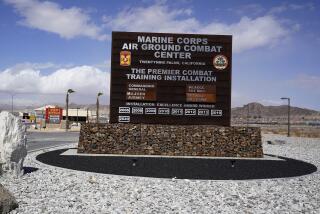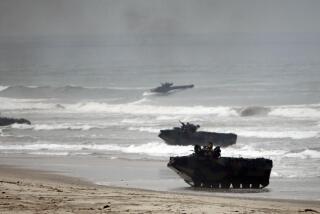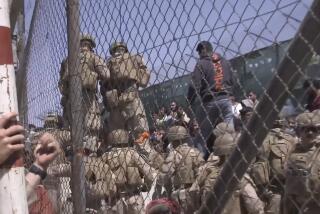Afghan Mine Kills Navy SEAL
WASHINGTON — A Navy SEAL was killed and another wounded in Afghanistan on Thursday when a land mine exploded during a training exercise near Kandahar, U.S. military officials said.
Navy Chief Petty Officer Matthew Bourgeois, 35, of Tallahassee, Fla., became the 33rd American killed in the nearly 6-month-old Afghan campaign. Bourgeois, a member of the Navy’s elite Sea, Air and Land force, was involved in small-arms training at 8:30 a.m. when the explosion occurred.
The injuries to the second SEAL, who was not identified, were not considered life-threatening, authorities said.
Thirteen servicemen and a CIA agent have been killed in combat-related deaths in Afghanistan, and 19 U.S. military members have been killed in nonhostile incidents, including plane crashes. The largest single loss of life came March 4, when two helicopters came under enemy fire near Gardez in eastern Afghanistan and seven Americans were killed.
Bourgeois, a 14-year Navy and SEAL veteran, left a wife and 7-month-old son, said Lt. Cmdr. Denise Shorey, a spokeswoman at the Little Creek Amphibious Base in Norfolk, Va.
In a news briefing, Defense Secretary Donald H. Rumsfeld conveyed his condolences to Bourgeois’ family and said he was “enormously grateful for his service. . . . This is, we’re reminded almost weekly, a dangerous effort.”
After decades of war, Afghanistan is one of the most heavily mined countries in the world, and the landscape is littered with aging explosives.
Five peacekeepers--three Danes and two Germans--were killed near Kabul, the Afghan capital, this month when an old Soviet-made SA-3 antiaircraft missile exploded as they were trying to destroy it.
In another development Thursday, Rumsfeld said U.S. forces would keep prisoners they consider dangerous in custody, even if they were acquitted of specific charges. He suggested that the detentions would last through the war on terrorism, not merely the Afghan campaign. U.S. leaders would consider the war over, he said, “when we feel there are not effective global terrorist networks functioning in the world that [the detainees] could go back to.”
Rumsfeld said it was “a matter of simple common sense” to hold prisoners who might pose a danger if released. He asserted that the same practice had been followed in earlier wars and that it was in keeping with the Geneva Convention.
“There is no question but that the United States has every right to defend itself,” he said.
The United States has detained hundreds of suspected Taliban and Al Qaeda fighters in Afghanistan and at the Guantanamo Bay naval base in southeastern Cuba. Officials have turned some over to other countries for trial and let others go because they were believed to pose no threat.
Meanwhile, Rumsfeld acknowledged that the United States and other countries in the anti-terrorism coalition are having trouble figuring out how to establish internal peace and security for Afghanistan.
Some United Nations officials, private analysts and others have argued that the 4,500-member international peacekeeping force that now patrols Kabul needs to be expanded to other cities to provide the security that will allow Afghanistan to recover.
The Bush administration has opposed this expansion, arguing that it could hinder the U.S. mission of fighting and destroying remaining Al Qaeda and Taliban forces. In addition, some major European countries, including France and Germany, have declined to provide more troops.
Rumsfeld said those calling for an expanded international force “are not offering troops, nor are they offering money” to pay for it.
He pointed out that the United States has begun training Afghans to be part of a new national army and is committed to taking other steps to improve the Central Asian nation’s security.
More to Read
Sign up for Essential California
The most important California stories and recommendations in your inbox every morning.
You may occasionally receive promotional content from the Los Angeles Times.











